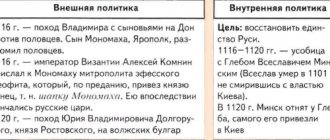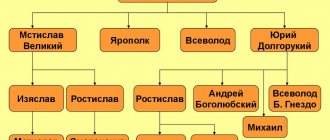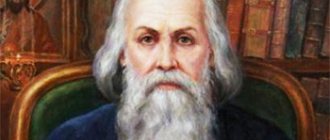And now I will tell you, my children, about my work, how I worked on the road and on the hunt from the age of thirteen. First I went to Rostov through the land of the Vyatichi; My father sent me, and he himself went to Kursk; and again I went to Smolensk a second time, with Headquarters Gordyatich, who then went to Berest with Izyaslav, and sent me to Smolensk; and from Smolensk he went to Vladimir. That same winter, my brothers sent me to Berestye to a conflagration that the Poles had burned, and there I ruled the city in peace. Then he went to Pereyaslavl to see his father, and after Easter from Pereyaslavl to Vladimir - in Suteisk to make peace with the Poles. From there again for the summer to Vladimir.
Then Svyatoslav sent me to Poland: I followed the Glogs to the Czech Forest, and walked in their land for four months. And in the same year, my eldest son, from Novgorod, was born. And from there I went to Turov, and in the spring to Pereyaslavl and again to Turov.
And Svyatoslav died, and I again went to Smolensk, and from Smolensk that same winter to Novgorod; in the spring - to help Gleb. And in the summer with his father - near Polotsk, and the next winter with Svyatopolk near Polotsk, and burned Polotsk; he went to Novgorod, and I went with the Polovtsy to Odresk to fight the war and to Chernigov. And again I came from Smolensk to my father in Chernigov. And Oleg came there, having been taken out of Vladimir, and I invited him to dinner with my father in Chernigov, at the Red Court, and gave my father three hundred hryvnias of gold. And again, coming from Smolensk, I fought my way through the Polovtsian troops to Pereyaslavl and found my father returning from the campaign. Then we went again that same year with my father and Izyaslav to Chernigov to fight Boris and defeated Boris and Oleg. And again they went to Pereyaslavl and stopped in Obrovo.
And Vseslav burned Smolensk, and I rushed with the Chernigovites on horseback with lead horses and were not caught... in Smolensk. In that campaign for Vseslav, he burned the land and fought it to Lukoml and Logozhsk, then to Drutsk in war and again to Chernigov.
And that winter the Polovtsians fought all over Starodub, and I, going with the Chernigov people and with my Polovtsians, took princes Asaduk and Sauk prisoner on the Desna, and killed their squad. And the next day, outside the New City, Belkatgin’s strong army was defeated, and all the seeds and prisoners were taken away.
And they went to the Vyatichi land for two winters in a row to Khodota and his son, and to Korden the first winter. And again we followed the Rostislavichs beyond Mikulin, and did not overtake them. And that spring - to Yaropolk for advice in Brody.
In the same year, the Polovtsians, who took Goroshin, were chasing Khorol.
That autumn they went with the Chernigovites and the Polovtsy-Chiteevichs to Minsk, captured the city and left neither servants nor cattle in it.
That winter we went to Yaropolk for a gathering in Brody and concluded a great friendship.
And in the spring my father placed me in Pereyaslavl above all the brethren, and they went after Supa. And on the way to the city of Priluki, the Polovtsian princes suddenly met us, with eight thousand, and wanted to fight with them, but the weapons were sent forward on carts, and we entered the city; only one seed was captured alive and several smerds, but our Polovtsians killed and captured more, and the Polovtsians, not daring to dismount from their horses, ran to Sula that same night. And the next day, on the Assumption, we went to the Belaya Vezha, God and the Holy Mother of God helped us: they killed nine hundred Polovtsians and took two princes, the Bagubars brothers, Autumn and Sakzya, and only two husbands ran away.
And then they chased the Polovtsy to Svyatoslavl, and then to Torchesk city, and then to Yuryev for the Polovtsy. And again on the same side, near Krasn, the Polovtsians defeated, and then with Rostislav they took the vezhi from Varin. And then he went to Vladimir again, put Yaropolk there, and Yaropolk died.
And again, after the death of my father and at Svyatopolk, we fought with the Polovtsians on Stugna until the evening, fought at Halep, and then we made peace with Tugorkan and with the other Polovtsian princes, and we took away our entire squad from Gleb’s child.
And then Oleg came against me with all the Polovtsian land to Chernigov, and my squad fought with them for eight days for a small rampart and did not allow them to enter the prison; I took pity on the Christian souls, and the burning villages, and the monasteries, and said: “Let not the pagans boast.” And he gave his father’s brother his table, and he himself went to his father’s table in Pereyaslavl. And we left Chernigov on St. Boris's day and rode through the Polovtsian regiments, about a hundred people, with children and wives. And the Polovtsians licked their lips at us like wolves, standing at the carriage and on the mountains, - God and Saint Boris did not hand me over to them for profit, we reached Pereyaslavl unharmed.
And I sat in Pereyaslavl for three summers and three winters with my squad, and we suffered many troubles from war and famine. And they went against their soldiers for Rome, and God helped us, they killed them and captured others.
And again Itlarev’s children were killed, and the vezhi took them, going beyond Goltav.
And they went to Starodub against Oleg, because he became friends with the Polovtsians. And they went to the Bug with Svyatopolk to Bonyak, beyond Ros.
And they went to Smolensk, having made peace with Davyd. We went again for the second time from Voronitsa.
Then the Torques came to me with the Polovtsy-Chiteevichs, and we went to meet them on Sulu.
And then again we went to Rostov for the winter, and for three winters we went to Smolensk. From Smolensk I went to Rostov.
And again Svyatopolk and he chased Bonyak, but... they killed him and did not overtake them. And then they chased Bonyak beyond Ros, and again they did not overtake him.
And he went to Smolensk for the winter; left Smolensk after Easter; and Yuriev’s mother died.
Returning to Pereyaslavl in the summer, he gathered his brothers.
And Bonyak came with all the Polovtsians to Ksnyatin; we followed them from Pereyaslavl beyond Sula, and God helped us, and their regiments defeated, and the princes captured the best, and after Christmas we made peace with Aepa, and, taking his daughter, we went to Smolensk. And then he went to Rostov.
Coming from Rostov, we again went against the Polovtsians on Urusova with Svyatopolk, and God helped us.
And then again we went to Bonyak to Lubn, and God helped us.
And then we went to the Warrior with Svyatopolk, and then again we went to the Don with Svyatopolk and Davyd, and God helped us.
And Aepa and Bonyak came to Vyryu and wanted to take him; Oleg and I and the children went to Romn against them, and when they found out, they ran away.
And then they went to Minsk against Gleb, who captured our people, and God helped us, and they did what they planned.
And then they went to Vladimir against Yaroslavets, unable to tolerate his atrocities.
And from Chernigov to Kyiv I went to see my father about a hundred times, traveling in one day, until Vespers. And in total there were eighty campaigns and three great ones, and the rest I don’t even remember the smaller ones. And he made peace with the Polovtsian princes, minus one, twenty, both with his father and without his father, and he gave away a lot of cattle and a lot of his clothes. And he released so many of the best Polovtsian princes from the shackles: two Sharukan brothers, three Bagubars brothers, four Osenev brothers, and a hundred other best princes in total. And God gave the princes themselves alive into the hands: Koksus and his son, Aklan Burchevich, the Tarev prince Azguluy and fifteen other young knights, these I, bringing alive, cut up and threw into that river Salnya. And separately he killed about two hundred of their best husbands at that time.
And this is how I worked, hunting, while I was sitting in Chernigov; and having left Chernigov, and until this year, he hunted and took without difficulty, not counting other hunts, outside Turov, where he and his father hunted every animal.
And this is what I did in Chernigov: I tied ten and twenty wild horses with my own hands in the forests, live horses, in addition to the fact that, while riding across the plain, I caught the same wild horses with my own hands. Two aurochs threw me with their horns along with the horse, one of the deer gored me, and of the two elk, one trampled with its feet, the other gored with its antlers; the boar tore off the sword on my thigh, the bear bit my sweatshirt at my knee, the fierce beast jumped on my hips and overturned the horse with me. And God kept me safe. And he fell from his horse a lot, broke his head twice and damaged his arms and legs - in his youth he damaged it, not valuing his life, not sparing his head.
What my boy had to do, he did it himself - in war and on hunts, night and day, in heat and cold, without giving himself rest. Without relying on mayors or birichi, he himself did what was necessary; He also established the entire routine in his own house. He himself established the hunting schedule for the hunters, and for the grooms, he took care of the falcons and hawks.
Also, he did not allow the poor bastard and the wretched widow to be offended by the powerful, and he himself observed the church order and the service.
Do not judge me, my children or anyone else who reads it: I do not praise myself or my courage, but I praise God and glorify his mercy for protecting me, a sinner and a bad person, for so many years from those mortal dangers, and He did not create me lazy, bad, but fit for all human deeds. After reading this letter, try to do all sorts of good deeds, glorifying God with his saints. After all, children, do not be afraid of death, neither war nor the beast, do the work of a man, as God sends to you. For if I have been protected from war, and from beasts, and from water, and from falling from a horse, then none of you can harm yourself or be killed until it is commanded by God. And if death happens from God, then neither father, nor mother, nor brothers can take you away from it, but if it is a good thing to beware yourself, then God’s saving is better than man’s.
Children of Vladimir Monomakh
At only 21 years of age, he married an English princess. The marriage, which lasted 24 years, produced eleven children.
Almost nothing is known about the second wife of Vladimir Monomakh. According to one version, she was Greek, according to another, a Swedish queen. Having lived with the prince for eight years, she gave him six heirs, the most famous of whom, of course, was Yuri Dolgoruky.
Monomakh's third wife, with whom he lived until the last days of his life, was a Polovtsian princess.
A week before turning 72, Vladimir Monomakh died. The death of the prince became a real grief for all of Rus': “the people cried for him, as children cry for their father or mother.”
Vladimir Monomakh - a worthy grandson of his grandfather
A wise and fair politician, a skillful and brave warrior, an intelligent and kind person - this is how historians speak of the eldest son of the first ruler of Kyiv, Vsevolod Yaroslavich. Born from the prince’s first marriage to the “Greek queen,” Vladimir, who received the nickname Monomakh from his mother, truly demonstrated an example of a multifaceted and versatile personality.
From his earliest years he was “lucky” to be, as he later wrote in his “Teachings,” in the claws of a bear, under the hooves of an elk, and on the antlers of a deer. But the young prince was not only involved in hunting: his father, a great erudite who knew several foreign languages, paid great attention to his son’s education. And the efforts of Vsevolod Yaroslavich were not in vain - in the future, Vladimir not only made competent political decisions, but also left behind an extensive epistolary legacy.
At the age of twenty, Vladimir Vsevolodovich received wealthy Smolensk as an inheritance from his father. Then the rich Chernigov became his fiefdom, to protect which the young prince repeatedly had to enter into confrontation with the Polovtsians and Mongol-Tatars.
After the death of Vsevolod, Vladimir had every chance of becoming the new ruler of Kyiv. However, he, judging that such a step would entail new strife “among the brethren,” gave up the “table” to Prince Svyatopolk.
A new milestone began in the biography of the cousins - the fight against the Polovtsians. Having become the organizer of several all-Russian campaigns, Vladimir Monomakh not only declared himself to be a brilliant commander, but also freed Rus' from a hateful enemy. Another important merit of his was the desire to unite and strengthen the Russian principalities.
Vladimir and Svyatopolk in Lyubech. A. D. Kivshenko. Source: regnum.ru
At the age of sixty, Vladimir Monomakh became the “head” of Kievan Rus. He had not yet taken the reins of government when a popular uprising broke out against the Jewish moneylenders. And here the reformatory talent of the Grand Duke did not fail to show itself. Having supplemented the “Russian Truth” written by his grandfather with his “Charter ...”, Vladimir Vsevolodovich made the life of the common people much easier.









